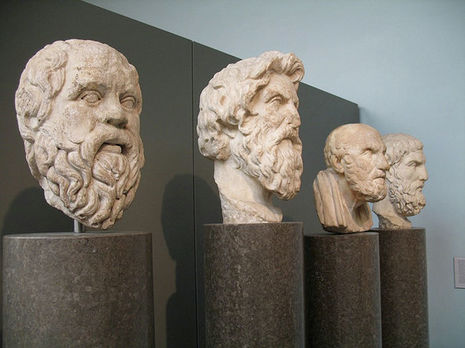Classics open letter calling for greater “anti-racism” efforts in the Faculty receives over 200 signatures
The open letter responds to an article recently written by Cambridge academic Dr. David Butterfield

Staff, students and alumni of the Faculty of Classics have written to Professor Robin Osbourne, Chair of the Faculty and the Faculty Board, in an open letter which calls for “an acknowledgement of the existence of systemic racism within Classics and its complicity in racist and white supremacist ideas both historically and in the present day”.
The open letter, which has received over 200 signatures, comes in response to a Spectator article that was published last month, written by Dr. David Butterfield, a Senior Lecturer in Classics at the university.
The open letter accused the article of “[downplaying] the existence of racism within the field of Classics and the under-representation of Black, Asian and Minority Ethnic (BAME) people within UK Classics, and substantially [mischaracterising] ongoing anti-racism efforts by Classics students at the University of Oxford.”
In a list of demands, the letter called for public acknowledgement of systemic racism within Classics as well as an acknowledgement of the “lack of ethnic diversity in both UK Classics as a whole and within our own Faculty”.
It also called for the data on BAME representation in Oxford and Cambridge Classics undergraduates which was referenced in the Spectator piece to be made publicly accessible.
In the article, Dr. Butterfield argued that there was little evidence to support the notion that present-day Classicists were directly complicit in the proliferation of racism; that the campaign to decolonise Classics needed to be better fleshed out; and posited that whilst ethnic diversity amongst senior academic staff in the field was lacking, referenced data at Oxford and Cambridge to show that undergraduate figures were in line with national numbers.
In an email to Varsity, Dr. Butterfield revealed that percentages of non-white applicants for the 3 year and 4 year course at Oxbridge from 2010-2019 were 12.6% and 17% respectively. He continued that the average proportions for the cohorts admitted over the past ten years were 12.7% and 15.3% BAME. The national proportion of BAME aged 19-26 is 18% in Britain, as stated in the Spectator article.
When approached for comment, Dr. Butterfield clarified two points, refuting allegations made in the open letter. “I do not claim that [complicity in white supremacy in Classics] is not true, but that such an allegation (which lands on both the discipline and its practitioners) needs supporting evidence - even if the term is being used tacitly in the technical sense of critical race theory. I do not - as alleged in the open letter - downplay the existence of racism tout court,” he said.
He continued: “There is (at least at Oxford and Cambridge) a notable gap between ethnic diversity among the undergraduates and senior academics. This nexus of problems needs exploration. I do not have the answer, but the intersection of socioeconomic class, educational opportunities and race may prove to be part of that answer. Expanding access to the Classics in schools will lead organically to diversifying the scholars who choose to study them at a higher level: no given person in the 21st-century has special access to the Classics.”
Another demand in the open letter was for the Faculty to commit to anti-racist work, and a “firm action plan to tackle the lack of ethnic diversity in the Faculty through both access and outreach work aimed at potential BAME undergraduates, and active recruitment of BAME graduate students, postdoctoral researchers, and lecturers”.
This was accompanied by further demands to establish anti-racism training in the Faculty, as well as a commitment to greater inclusivity within the undergraduate and graduate curricula by “ensuring that assigned primary sources represent a variety of authorial identities and lived experiences from the ancient world”, and diversifying secondary reading lists.
In his official statement to Varsity, Dr. Butterfield wrote: “I regret that the open letter does not properly represent what I have argued and what I continue to believe. But these are complex issues that demand open discussion and debate, which will certainly occur next term. Until then, I do not think that written contributions will be a productive way forward. I am convinced, however, that across the community of Classicists our agreements vastly outweigh our disagreements: we are all passionate about the subject and its future, we all wish the Classics to be open and welcoming to everyone, we all reject racism, and we all aspire to debate these issues fairly and in good faith.”
Professor Osbourne did not provide a comment when contacted by Varsity.
 News / Judge Business School advisor resigns over Epstein and Andrew links18 February 2026
News / Judge Business School advisor resigns over Epstein and Andrew links18 February 2026 News / Gov grants £36m to Cambridge supercomputer17 February 2026
News / Gov grants £36m to Cambridge supercomputer17 February 2026 News / Hundreds of Cambridge academics demand vote on fate of vet course20 February 2026
News / Hundreds of Cambridge academics demand vote on fate of vet course20 February 2026 News / CUCA members attend Reform rally in London20 February 2026
News / CUCA members attend Reform rally in London20 February 2026 News / Union speakers condemn ‘hateful’ Katie Hopkins speech14 February 2026
News / Union speakers condemn ‘hateful’ Katie Hopkins speech14 February 2026









